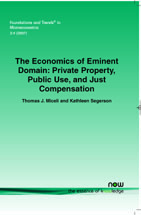The Economics of Eminent Domain: Private Property, Public Use, and Just Compensation
By Thomas J. Miceli, Department of Economics, University of Connecticut, USA, thomas.miceli@uconn.edu | Kathleen Segerson, Department of Economics, University of Connecticut, USA
Abstract
The eminent domain clause of the U.S. Constitution concerns the limits of the government's right to take private property for public use. The economic literature on this issue has examined (1) the proper scope of this power as embodied by the "public use" requirement, (2) the appropriate definition, and implications, of "just compensation," and (3) the impact of eminent domain on land use incentives of owners whose land is subject to a taking risk. This essay reviews this literature and draws implications for our understanding of eminent domain law.
The Economics of Eminent Domain
The Fifth Amendment of the U.S. Constitution reads "nor shall private property be taken for public use, without just compensation". Often referred to as the eminent domain or takings clause, economists have made significant contributions to the understanding of both the proper scope of takings and when compensation should be paid. The Economics of Eminent Domain: Private Property, Public Use, and Just Compensation presents an overview of the economics of eminent domain. Beginning with a brief review of the relevant case law for both physical acquisitions and for regulatory takings, the authors survey the economics literature examining eminent domain. The next section considers the economic justification for eminent domain, focusing on the public use requirement and the land assembly problem. It then examines the just compensation requirement, focusing primarily on its distributional implications. The authors survey the literature on the impact of compensation on the incentives of landowners to invest in property subject to a taking or regulatory risk and of the government to exercise its taking or regulatory powers. Throughout The Economics of Eminent Domain, the authors use a simple modeling framework that can be adapted to address various issues discussed in the literature allowing examination using a common paradigm
